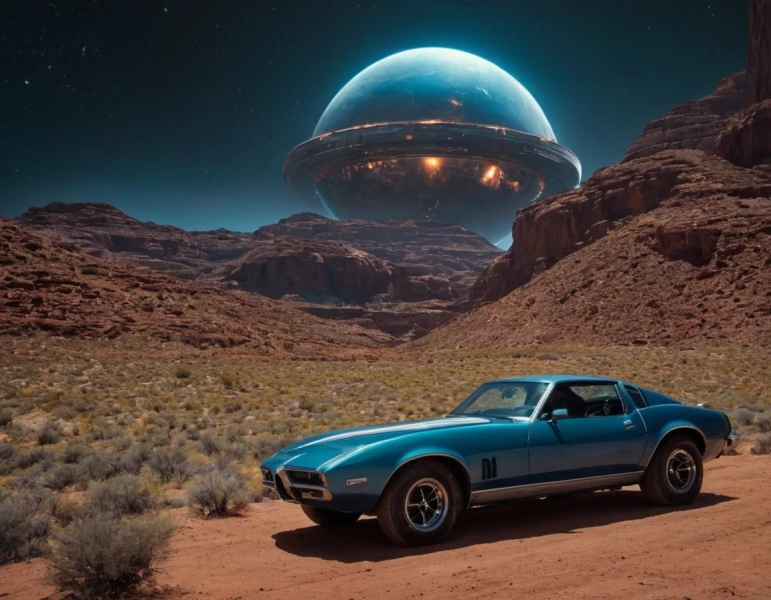Educa UNIVERSITY|SCIENCE AND ENGINEERING
Science Fiction Movies: What the Hell Are They?
Related Masters
Science Fiction Movies: What the Hell Are They?
Hello, I'm Amadeo Perez and today I come to talk to you about something that has been part of my life for as long as I can remember: science fiction movies. Not that I feel like a textbook expert, but believe me when I tell you that, throughout my life, I've seen more spaceships and robots on the screen than people on the street.
Let's get down to basics: What the heck is a science fiction movie?
Easy. They are stories that play with science to create alternative worlds, explore dystopian futures or investigate the consequences of technological advances. It's not magic, it's not fantasy. It's science -or so it seems, until giant monsters and laser guns start appearing and destroying entire cities.

The Origins of the Genre: From Silent Movies to Blockbusters
I'll tell you that it all started with black-and-white films, back in the 1900s, when silent movies were the only way to tell stories. Journey to the Moon (1902) by Georges Méliès was among the first to take a walk on the Moon, using very rudimentary special effects, but they blew our minds back then. From then on, the genre has evolved by leaps and bounds, cramming in more and more special effects and lots of imagination.
In the 30s and 40s, series like Flash Gordon and Buck Rogers were ahead of their time with intergalactic stories and space adventures. But it was in the 1950s when we began to talk about the golden age of science fiction, with films like The War of the Worlds or The Day the Earth Stood Still.These films not only made you dream of aliens and distant planets, they also played with the fears of the time, such as the Cold War and the nuclear threat.
Science Fiction: Hard or Soft? There's Everything!
Now, within the genre there are nuances. The hard science fiction is that which strives to be faithful to known scientific and physical laws. Movies like Mission Rescue (2015), where they explain to the letter how to survive on Mars by planting potatoes. All very scientific, right?
In contrast, soft science fiction prefers to focus on the social consequences of technological advances. That's where classics like Terminator (1984) come in, telling you what happens when an artificial intelligence like Skynet decides that humans are expendable. And who cares how the AI was created?What matters is that it's going to wipe you out!
Subgenres: Science Fiction For All Tastes
This is where things get fun, because the genre branches off into subgenres for all tastes. Space opera, cyberpunk, apocalyptic, steampunk.... there's everything.
Space opera: epic stories set in outer space.Examples? Star Wars and Star Trek, those movies that combine spaceships, epic battles and lots and lots of galactic speculation. This subgenre is perfect if you like space heroes and intergalactic wars.
Cyberpunk: This is where things get more dark and dystopian. It imagines a future where large corporations rule the world and technology has made humanity corrupt. Think Blade Runner (1982), a cinematic gem that reflects on artificial intelligence and what it means to be human.
Apocalyptic/post-apocalyptic fiction: The world is going to hell. Natural catastrophes, nuclear wars, pandemics.... Anything goes. Examples such as Mad Max or The Book of Eli show us what happens when everything collapses and the only thing left to do is survive.
The Greatest Works of Science Fiction Cinema
Over the years, the genre has given us true masterpieces. Some of the most influential films that any sci-fi lover should see include:
- 2001: A Space Odyssey (1968), a film that redefines the concept of "space epic". It's a journey through the mysteries of the cosmos that leaves you thinking for days.
- Blade Runner (1982), a cyberpunk classic that makes you question what it means to be human when androids are so advanced they could pass for people.
- Star Wars (1977), which, while mixing elements of fantasy with science fiction, has been key to making millions of people fall in love with the genre.
- Matrix (1999), another work that revolutionizes the genre, asking us whether what we see is real or simply a simulation.
Why We Love Science Fiction So Much
What I love most about science fiction is how it allows us to dream and reflect on our own future. Each film is an opportunity to imagine a different world, to think about what would happen if we were able to travel to other planets, create artificial intelligence or even travel in time. Who hasn't dreamed of a time machine after watching Back to the Future?
In addition, the genre touches on topics that we care deeply about: the impact of technology, the dangers of AI, human survival in an apocalyptic world.... And all this with jaw-dropping special effects.
Science Fiction Today: Unstoppable Evolution
The genre continues to evolve by leaps and bounds. In recent years, films like Interstellar (2014), Dune (2021) and Avatar (2009) have once again pushed the boundaries of what we can imagine. With each new technology that develops, science fiction adapts and grows, imagining futures that may be just around the corner.
So you know, if you haven't yet immersed yourself in this world of space travel, artificial intelligence and futuristic dystopias, what are you waiting for? Science fiction movies not only entertain, they also make us think about the future we want (or fear)!
Sci-fi movies don't just entertain, they also make us think about the future we want (or fear)!
Faculties
Trainings
The faculties embrace diverse academic disciplines and fields of study, opening doors to new perspectives and exploring different spheres of wisdom in a constantly evolving world.














